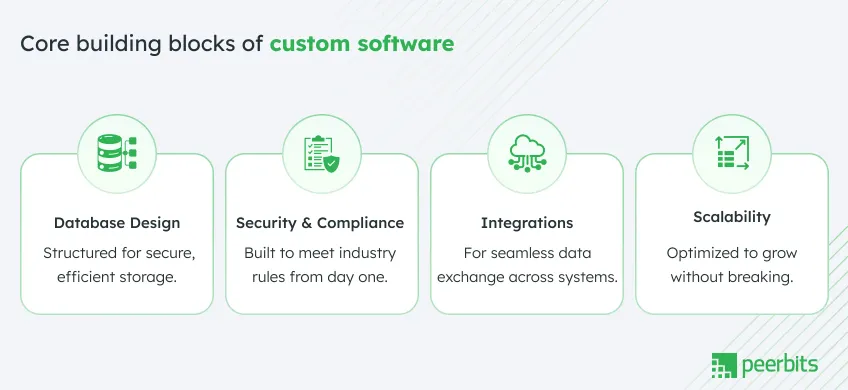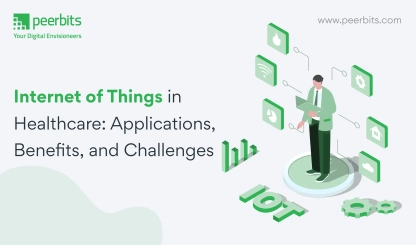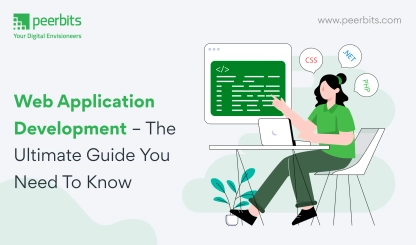Every growing business often comes across the buzz of custom software in its business journey. With an estimation of 43.16 billion dollars in 2024, the market size of custom software development is projected to reach USD 146.18 billion by 2030, based on Grand View Research.
But while custom software is widely popular, developing truly effective software is still challenging. Already, 64% of outsourced services are related to software application development. Yet many struggle in building something custom that syncs exactly with the vision of the client.
Imagine a common feature like real-time tracking. In logistics, that means tracking goods globally in seconds. In fintech, it's about instant fraud detection. While in healthcare, it will indicate that a patient's data needs to sync securely across clinics.
You can easily spot how the same feature can mean completely different things depending on the sector. That also means a single solution can't serve all industries as well.
So, how should you approach custom software development?
What industry-specific custom software challenges can you encounter in this?
This blog dives into all those key software industry challenges across healthcare, fintech, and logistics, with expert-led solutions from the ground up. But first, some basics.
What is custom software development & How is it beneficial?
Custom software development means building software specifically based on your business’s workflow, regulations, and unique requirements. Unlike off-the-shelf or white-label tools, custom software development services focus on developing software based on your vision that is not restricted by one-size constraints.
Some of the major benefits that custom software brings to your business are:
1. Saves time & money: They help you avoid unnecessary features, cut licensing costs, and align with compliance needs.
2. Scales easily: Custom solutions grow with your business and adapt to your regulatory shifts for long-term fit.
3. Industry-specific advantage: Custom software helps you tackle software industry challenges unique to your sector while offering flexibility to innovate.
4. Future-proof choice: Off-the-shelf tools often become limiting when regulations or customer expectations change. But custom software solutions can keep up with such changes easily.
In plain terms, if someone asks- Why is custom software better than ready-made solutions? The answer is that it solves software industry challenges specific to your sector, providing flexibility to innovate and reducing long-term friction.
Key components of custom software development
When approaching software design, I always start with the core building blocks. These key components lay the foundation and shape how the entire development process is structured.

- Database Design: Structured for secure, efficient storage.
- Security & Compliance: Built to meet industry rules from day one.
- Integrations: For seamless data exchange across systems.
- Scalability: Optimized to grow without breaking.
Though the emphasis of this structure can shift across sectors. For example:
- In healthcare, interoperability is essential for connecting patient systems.
- In fintech, security layers guard against fraud and ensure regulatory challenges are met.
- In logistics, scalable real-time tracking underpins all operations.
Each industry faces its own unique challenges requiring expert-driven solutions. But the one universal priority in all sectors for software development planning is ensuring compliance. For that, you should know the core compliance differences between industries.
Quick guide on compliance differences across industries
Compliance is a major factor that sets industries apart. In simple terms, compliance defines the rules that are for consumers’ data protection. But as countries and sectors change, these rules become more diverse and often confusing.
So, if you’re starting with custom software, keep these key differences in mind for healthcare, fintech, and logistics from the get-go:
| Industry | Key Compliance Standards | Risks of Non-Compliance |
|---|---|---|
| Healthcare | HIPAA, GDPR | Fines, patient lawsuits, system shutdowns |
| Fintech | PCI DSS, AML/KYC | Regulatory penalties, fraud, reputational loss |
| Logistics | Customs regulations, trade laws | Shipment holds, extra taxes, legal blockages |
Following these rules helps you keep your software free of any data issues. Though, if you are wondering what happens to the ones who don't comply?
Well, businesses ignoring these requirements bring real consequences involving:
- Lawsuits in healthcare,
- Heavy fines in fintech, and
- Disrupted supply chains in logistics.
If you don’t respect software industry challenges for fintech, logistics, or healthcare, you might end up paying twice financially and operationally.
Beyond the shared focus on compliance, each industry faces unique challenges that can make your custom software journey demanding. I’ve highlighted proven and tested solutions practiced at Peerbits to help you deal with all those different industry-specific hurdles in custom software development.
Custom software solutions for industry-specific challenges
Here’s how Peerbits assesses and solves the industry-specific challenges in Healthcare vs Fintech vs Logistics, and makes sure to bring the ultimate potential of your business upfront.
Challenges in Healthcare
Healthcare is one of the most sensitive industries, requiring the highest level of care when designing custom software. Whether you’re starting out or facing issues during development. Here are proven solutions to healthcare challenges that directly impact business outcomes:
| Healthcare Challenges | How Peerbits Solves it with Custom Software | Business Benefits |
|---|---|---|
| HIPAA compliance and data protection issues | Build privacy-first architecture with encrypted storage, access logs, and audit tracking | Improves patient trust and prevents legal penalties |
| Systems interoperability (EHRs, labs) lacking | Uses FHIR-based APIs for consistent data exchanges across systems | Allows seamless data sharing, avoids treatment delays |
| Lacking data security for sensitive medical records | Implements multi-layered encryption, MFA, and secure audit trails | Reduces breach risk and liability |
| Telehealth scalability missing | Design cloud-native, HIPAA-certified hosting with load balancing | Supports demand spikes and remote patient access |
Building custom systems around healthcare industry challenges, like interoperability and data security, isn’t optional anymore; it’s mandatory. With the expert guidance of healthcare software development service providers, it can become functional and compliant in equal measure.
See how Peerbits impacts healthcare with real results ➡
Challenges in Fintech
Fintech is one of the most compliance-heavy industries, demanding airtight security and precision in custom software design. Whether you’re beginning a project or tackling hassles mid-way, here are proven solutions to fintech challenges that you should never ignore:
| Fintech Challenges | How Peerbits Solves it with Custom Software | Business Benefits |
|---|---|---|
| PCI DSS compliance | Architect tokenized payment flow from the start | Minimizes risk and builds trust |
| Fraud detection lacking | Integrate AI-based models that adapt in real-time | Prevents loss and enhances security |
| Need Secure payments | Build secure APIs with encryption and authentication | Protects customer finances |
| Low-latency real-time monitoring | Use optimized architecture for speedy transactions | Improves user experience and retention |
When you build software with challenges facing fintech in mind, you avoid fintech software development mistakes like unsecured APIs or weak fraud detection. From my experience, fintech firms thrive when compliance and security are built from the beginning instead of being added later on.
Discover Peerbits’ impact in the fintech industry ➡
Challenges in Logistics
Logistics is one of the most complex industries, where efficiency and real-time visibility define success. Here are proven solutions to logistics challenges that can directly impact your operations and business performance:
| Logistics Challenges | How Peerbits Solves it with Custom Software | Business Benefits |
|---|---|---|
| Real-time shipment tracking | Use IoT and GPS integrations with real-time updates | Keeps operations smooth and transparent |
| Customs & trade compliance | Add automated compliance checks for trade regulations | Reduces delays and avoids fines |
| Route optimization lacking | Apply AI to minimize distance and fuel use | Cuts costs and delivery times for rides |
| Need Data visibility across partners | Create shared dashboards and APIs within secure systems | Improves coordination and trust for your consumer |
Custom-built systems offered by logistics software development firms use the right tools to meet logistics industry challenges. In my experience, these tools transform operations and reduce error rates dramatically.
Find Peerbits' success stories of logistic projects ➡
Conclusion
As understood so far, in healthcare, fintech, and logistics, custom software has its own unique challenges that need its own unique solutions. Especially when software is custom-built with compliance, performance, and interoperability in mind, it’s not just functional, it’s a powerful, competitive asset.
If you're planning to hop in for custom software, ask not only “What features do I want?” but also “What issues and compliance rules does my industry demand?” for which the above summary tables can prove to be extremely helpful. A well-planned approach not only makes your custom software scalable but also saves money by avoiding hefty fines and the hassles of meeting compliance or industry-specific requirements later. For more expert insights on tech and software, explore our blogs, and don’t forget to follow us on LinkedIn.

FAQs
Off-the-shelf tools are generic and may not meet healthcare industry challenges or regulatory challenges in fintech. Custom builds compliance from Day 1 & can be updated based on the future transformation with ease.
Healthcare leads, with HIPAA and data privacy. Fintech follows closely, driven by PCI DSS and anti-fraud rules. Logistics faces shifting trade laws across regions.
Yes many use modular, compliant microservices that scale for custom software requirements. It costs less over time versus licensing fees or compliance failures.
You risk fines, reputational damage, blocked operations, and even shutdowns that no company wants by failing to meet the compliance.
Typically 3-5 months but engaging experts at Peerbits make sure you start compliance early, shortening the time and saving your business from expensive fixes.








